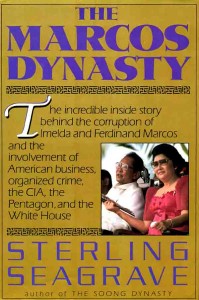 Travelers to the Philippines will invariably want to find out more about the history of the country after having seen it, but good books (and bookstores!) in the Philippines are hard to find. In particular, books on Philippine history are virtually impossible to be found anywhere.
Travelers to the Philippines will invariably want to find out more about the history of the country after having seen it, but good books (and bookstores!) in the Philippines are hard to find. In particular, books on Philippine history are virtually impossible to be found anywhere.
In the picturesque northern Luzon city of Vigan, for example, you’ll encounter two important historical houses, the Mansion Syquia, and the Crisologo Museum, homes of former political bosses Elpidio Quirino and Floro Crisologo. You’ll see lots of pictures and artifacts in those houses, but nothing objective about their careers. This is where The Marcos Dynasty (1988, ISBN 0-06-015815-8), a wonderful book by Sterling Seagrave and his long-time collaborator Peggy Sawyer Seagrave comes in handy, and don’t let the fact that the book was published over 20 years ago fool you. The information it contains about how politics in the Philippines works pertains pretty much today as it did when the book was written.
As he did in his earlier book on the Soong Dynasty, Seagrave here conducts an exhaustive but fascinatingly written appraisal of a family that essentially controlled a country. Some of the fascinating threads in the book include those on the heroin trade, Japanese occupation, the CIA, the Japanese Yakuza underworld, the perfidy of Gen. Douglas MacArthur, and of course, the shenanigans of Ferdinand and Imelda Marcos.
Seagrave’s writing is especially interesting in view of his understanding of Asian cultures (he lived a significant part of his life there) and has a keen understanding of the fact that in Asia, actions generally are not a matter of black and white, but usually occupy a gray area not understood by most Westerners. Consider this excerpt from the Marcos book on the concept of “lying”:
In Asia, lying to strangers bears none of the social stigma attached to it in the West. When Chinese are asked about their background, they usually invent one to suit the occasion. So do the Burmese, the Thais, and the Malays. It is a venerable tradition to lie to protect the truth, to protect one’s ancestors, one’s family, and one’s fragile psyche, not to mention one’s neck. It is not lying, but the creation of a fiction that will gratify the interrogator, which—on reflection—is really an act of courtesy.
Borrowing freely from others, the young Ferdinand Marcos created an entirely different identity for himself, a much happier one than his own, in which he was the hero, the boss, and the driving force. When he decided to go into politics, he went public with this fanciful legend, and used it to build a remarkable international career. In doing so, he was different from other charlatans only in the matter of degree. His success grew out of his resourcefulness, the gullibility of his audience, and the venality and opportunism of Washington.
The legend creatively and effectively created by Ferdinand and Imelda Marcos becomes the great story of the book, and its subplots are remarkable in their intricacy. Like the earlier-mentioned book on the Soong dynasty, and Paul M. Handley’s exceptional The King Never Smiles (a biography of the King of Thailand) this book is essential reading for anyone wishing to understand why things operate the way they do in the country. As a visitor, one encounters situations every day which, frankly, can best be explained by an author unexposed to political retribution for investigating, then writing about them. In the Philippines, everything from un-navigable roads to political assassinations are the result of “politics as usual,” and Seagrave provides an important study of just how things came to be the way they are.
There are loads of secret agreements discussedin the book, including a number with CIA-related entities.
Interesting!
i haven’t read the book, but I do know that Atty. Ferdinand Marcos participated in the negotiation of international treaties signed by then Pres. Quirino for the Philippines.
Are any of these secret multi-lateral treaties mentioned there?